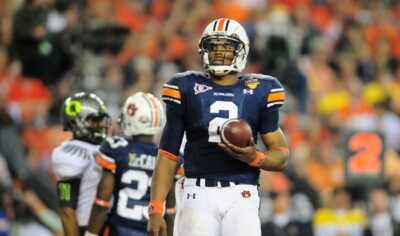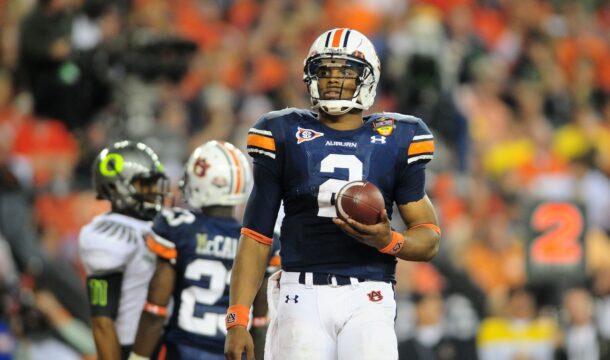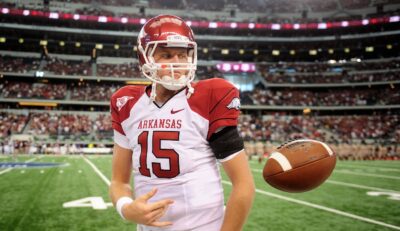
The SEC ate its quarterbacks in 2015. Just three topped 3,000 yards during the regular season. Those same three — Chad Kelly, Dak Prescott and Brandon Allen — were the only three to throw for more than 20 TD passes.
Jacob Coker eventually accomplished both but needed 15 games to do so.
The scary part? Next season might not be substantially better as three of those four are gone and most of the league will have a different opening day starter under center than the guy who started the 2015 season finale.
Here’s a look:
Two at the top
Chad Kelly, Ole Miss: Kelly spurned the NFL Draft to return to Oxford. He’s by far the best of the bunch, and he’ll try to become the first QB in SEC history to throw for 4,000 yards twice in a career.
Joshua Dobbs, Tennessee: Dobbs will try to lead Tennessee to its first SEC title since Phil Fulmer wore the headsets. He’s poised to do damage after throwing 15 TDs and just 5 interceptions. And that doesn’t even begin to describe his threat as a runner.
Time to trust …
Brandon Harris, LSU: Was it scheme or skill that slowed the Tigers’ passing attack in 2015? Les Miles’ critics — and there are many, not all named Booger — would insist it’s scheme. Harris has a big arm, a Heisman Trophy-worthy running back behind him to keep linebackers busy and deep threats to stretch the field. In other words, he has weaponry necessary to throw for 3,000 yards and 25 TDs.
Key number in 2016? 370. LSU attempted just 277 passes in 2015, by far the fewest in the league and 200 fewer than each of the top 3. Harris had a solid TD/INT ratio of 13/6 last season. Give him 100 more attempts, a third of which should deep balls, and LSU’s offense won’t be nearly as one-dimensional as this past year.
Jeremy Johnson, Auburn: The Tigers’ offense works better when the QB is a threat to run. Sean White is not that. Johnson is, and we saw the difference — again — in Auburn’s bowl game. White might be a better pure passer — though the numbers don’t exactly shout that — but Johnson gives Auburn the best chance to be Auburn.
The next wave …
Jacob Eason, Georgia: The much more experienced Greyson Lambert could retain his starting job, but the sense is new start, new era, new QB in Athens. It’s worth stressing that freshmen quarterbacks don’t dominate the SEC, but facts won’t dampen the hype surrounding Eason’s upside.
Blake Barnett, Alabama: Barnett will battle slightly-ahead Cooper Bateman for the starting job. Nick Saban has stayed true to his develop-back up-start system, but he’s never had a QB with Barnett’s credentials. It’s quite possible, if not likely, that Barnett hops past Bateman this spring. While true freshmen QBs haven’t dominated the SEC, redshirt freshmen have. Barnett was an early enrollee, so he has had ample time in the system.
Most interesting spring battles outside Alabama
Jake Hubenak vs. Trevor Knight, Texas A&M: The winner gets to throw to the best receiving combo in the SEC. And the winner will be throwing it: Only Ole Miss and Mississippi State threw it more often last season than the Aggies (482). Hubenak, more of a pocket passer with limited first-team reps, threw for 307 yards and two touchdowns in the Aggies’ bowl loss against Louisville. Knight, who threw for 348 yards and 4 TDs to lead Oklahoma past Alabama in the 2013 season’s Sugar Bowl, fell out of favor and lost his starting job to Baker Mayfield. As a graduate transfer, he’s eligible to play immediately.
Luke Del Rio vs. Austin Appleby vs. Treon Harris vs. Feleipe Franks, Florida: Florida is still recovering from the Will Grier mess. Del Rio is a former 3-star prospect who already is at his third school. Appleby is a graduate student from Purdue who is eligible immediately. The fact that he’s in Gainesville is the loudest signal yet that Harris’ career as a full-time signal-caller are over. Franks clearly represents the future and is the highest-rated of the bunch.
Drew Barker vs. Stephen Johnson, Kentucky: Like Shurmur, Barker played as a (redshirt) freshman and saw his primary contender transfer. He’s the frontrunner … unless Stephen Johnson steals it this spring. Johnson is a dual-threat QB who transferred from College of the Desert (Calif.)
https://twitter.com/KSTV_Sports/status/689284132388651009
Better days ahead …
Kyle Shurmur, Vanderbilt: The job is his, but it goes without saying that a league-low 42.7 completion percentage must dramatically improve. Myriad factors contributed to that number — starting with the fact he played as a true freshman behind a shaky line on a team lacking a deep threat — but improvement has to start with him.
Drew Lock, Missouri: Last season was the most tumultuous in program history. On the field, off the field, seemingly every week brought a new challenge. Lock survived it — barely. Maty Mauk is gone for good, so Lock can move forward knowing it’s his team.
Questions, questions, questions …
Lorenzo Nunez, South Carolina: Does he beat Perry Orth for the job? Does Kurt Roper build an offense around Nunez’s athletic, versatile skill-set? Nunez clearly brings an added dimension, and Will Muschamp and Roper preferred the more athletic Jeff Driskel (over Jacoby Brissett) and recruited Treon Harris when they last teamed up at Florida.
Good luck …
Nick Fitzgerald, Elijah Staley, Mississippi State: The Bulldogs are starting over. Fitzgerald enters spring as the top candidate to replace the irreplaceable Dak Prescott. Staley, a dual-threat QB, recently decided to stop playing basketball for the Bulldogs and focus solely on football.
Austin Allen, Ricky Town, Arkansas: Brandon Allen threw 30 TD passes in 2015, second in the SEC behind Chad Kelly’s 31. His younger brother, Austin, will battle Southern Cal transfer Ricky Town for the starting job. Town was a four-star recruit and No. 6-rated pro-style quarterback in the class of 2015.
Managing Editor
A 30-time APSE award-winning editor with previous stints at the Miami Herald, The Indianapolis Star and News & Observer, Executive Editor Chris Wright oversees editorial operations for Saturday Down South.







